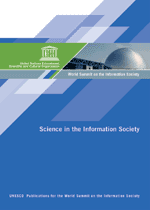 The WFP helps people who look like this!
The WFP helps people who look like this!Read "U.S. Nominates State Department Official to Head U.N. Aid Agency" by Colum Lynch in The Washington Post, September 30, 2006.
The Bush administration yesterday proposed Josette Sheeran (Shiner) to head the U.N. World Food Program. The United States pays for nearly half of the agency's $2 billion annual budget and traditionally the World Food Program has been headed by an American. However, now governments of Canada and several European countries are fielding their own candidates for the post.
Sheeran is currently the U.S. Undersecretary of State for economic affairs and was formerly Deputy United States Trade Representative. Both of these jobs suggest she is well qualified for the WFP post,
However, at one time she was the managing editor of the Washington Times, a conservative newspaper. Wikipedia states that
The Times was founded in 1982 by Sun Myung Moon, leader of the Unification Church and the Family Federation for World Peace and Unification, to be a conservative alternative to the larger Washington Post. The Times is widely perceived as maintaining a right-leaning editorial stance. By 2002, the Unification Church had spent about $1.7 billion in subsidies for the Times.The Inner City Press reports
that Josette Sheeran (Shiner) was an active member of Rev. Sun Myung Moon's Unification Church from 1975 through at least 1996. After that date, it is reported that she went "into the world," including into William Bennett's Empower America organization and then the U.S. State Department, in order to spread the Unification Church's message and position.I found this site on the web about Shiner and her links to Moon.
The World Food Program is the food aid arm of the UN. WFP provides food in poor countries to help meet emergency needs and uses food aid to support economic & social development. It is an important vehicle for humanitarian and development assistance. It also helps American farmers since providing food to people too poor to buy it thereby reduces the supply of food to those who do buy (and since prices reflect the balance between supply and demand in the market, keeping prices higher).
The unwritten agreements distributing leadership of key international agencies are longstanding, and widely respected. The director's job of the WFP is economically and diplomatically important to the United States.
I suspect that the competition to Sheeran is partly due to her personal background. It is also probably related to a general loss of influence of the United States with other nations as a result of their disagreement with U.S. policies for the last six years. John Bolton's approach to diplomacy may not help matters.
More Generally About U.S. Influence in International Agency Appointments
Ban Ki-Moon, South Korea's foreign minister, received 13 votes in favor, one against and one with no opinion from the 15-member UN Security Council in a straw vote Thursday, making him the leading candidate for the job of Director General starting next year. Another, more telling, straw poll will be conducted on Monday. The Bush administration has supported Ban.
The top jobs is also open at the World Health Organization, where (Jim Hoagland reports) China is making a strong push
Republican officials who recently were appointed to head prominent international agencies include World Bank President Paul D. Wolfowitz and Ann M. Veneman, the executive director of the U.N. Children's Fund (UNICEF). Both appointments were controversial, but the were pushed through by the United Sates. (For Veneman background click here.)




